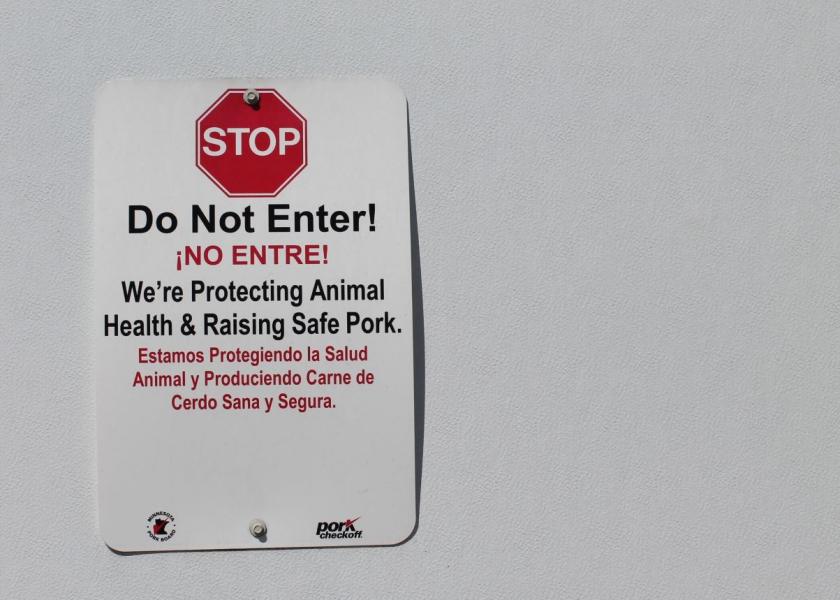What Are the Stakes if We Fail to Make Progress in Biosecurity?

Is the U.S. pork industry making progress in the area of biosecurity? Derald Holtkamp, DVM and professor in the Department of Veterinary Diagnostics and Production Animal Medicine in the College of Veterinary Medicine at Iowa State University, says it depends on how you measure progress.
“If you measure progress by the number of things we are doing, then yes, we are making progress in biosecurity. If you measure results, however, I think the answer is no,” Holtkamp said during the biosecurity seminar at the American Association of Swine Veterinarians (AASV) annual meeting in Nashville, Tenn.
He says the incidence of outbreaks caused by porcine reproductive and respiratory syndrome virus and porcine epidemic diarrhea virus in sow farms remains persistently high. Lateral introductions of viruses and pathogens into groups of growing pigs continue to occur at a high frequency and wean-to-market mortality is high and increasing. In short, the health of pigs is not improving, Holtkamp says.
"The lack of progress in the intended outcomes of biosecurity has occurred despite the increased implementation of biosecurity practice, such as trailer washing and showers. The lack of improvement in outcomes suggests that significant unaddressed biosecurity hazards remain," he adds.
Holtkamp posed a poignant question to the veterinarians, producers and allied industry in attendance. What are the stakes if we continue to fail to make progress?
Eight speakers from around the globe gathered to tackle the topic of biosecurity from building design to baking livestock trailers and more. Here are a few quotes worth repeating.
“Pain prompts action.” – Bethany Heitkamp, DVM, Cooper Farms, in “Biosecurity for Supply Entry”
“The most basic principles for biosecurity remain the same in layers as pigs. The most important aspect of those principles is to maintain the line of separation. The lowest hanging fruit of biosecurity is to prevent disease from being ‘walked’ into a farm.” – Craig Rowles, DVM, in "Biosecurity Ideas from the Egg Industry"
“I think it’s important to set expectations for disease outbreak investigations. The first one is that we may not find the exact cause of the outbreak in every case. There may not be a “smoking” gun. Second, we are not there to assign blame for the outbreak to one or more individuals. Our goal is to identify significant biosecurity hazards. The outcome is being able to identify what happened.” – Kate Dion, DVM, DDDD, in “Conducting Effective Outbreak Investigations Using the New Web-Based Outbreak Investigation Instrument”
“You always learn something new when someone else gets involved in a disease outbreak investigation.” – Matt Ackerman, DVM, Innovative Veterinary Solutions, in “Outbreak Investigation of a Gilt Developer Unit”
“Control measures related to biosecurity should be very simple and intuitive trying to interfere as little as possible on the production work. At the same time, measures should be strong enough to provide sustainable compliance over time.” – Anna Romagosa, DVM, Health Assurance Department, PIC Europe, in “State of the Art Swine Facility Designs for Biosecurity”
“Veterinarians need a stronger voice when structural and resource decisions are being made on the farm.” – Derald Holtkamp, DVM and professor in the Department of Veterinary Diagnostics and Production Animal Medicine in the College of Veterinary Medicine at Iowa State University in “A Standardized Outbreak Investigation: A New Approach for Identifying and Prioritizing Biosecurity Hazards”
“As we think through biosecurity, one of the things I really like to think about and share with our people that work on farms and visit our farms is this concept of the Swiss cheese approach to biosecurity. Think about layers. Each process or protocol may not be perfect. There might be some holes that you can punch in that individual layer of Swiss cheese, but the more layers we can put in place reduce the chance of disease making it all the way to our pigs.
Also, make the right thing easy – incentivize good behavior. What we put in place to think about the natural flow of people, pigs and events, within our facilities to really create a good biosecurity environment?” – Katie Coleman, DVM, Iowa Select Farms in “Building Design and Processes for New Builds and Remodels”
Read more:
What Everyone Was Talking About at AASV's Annual Meeting
Allerson Wins AASV's Outstanding Practitioner of the Year Award
Merck Animal Health Awards $50,000 in Scholarships to Future Swine Practitioners







